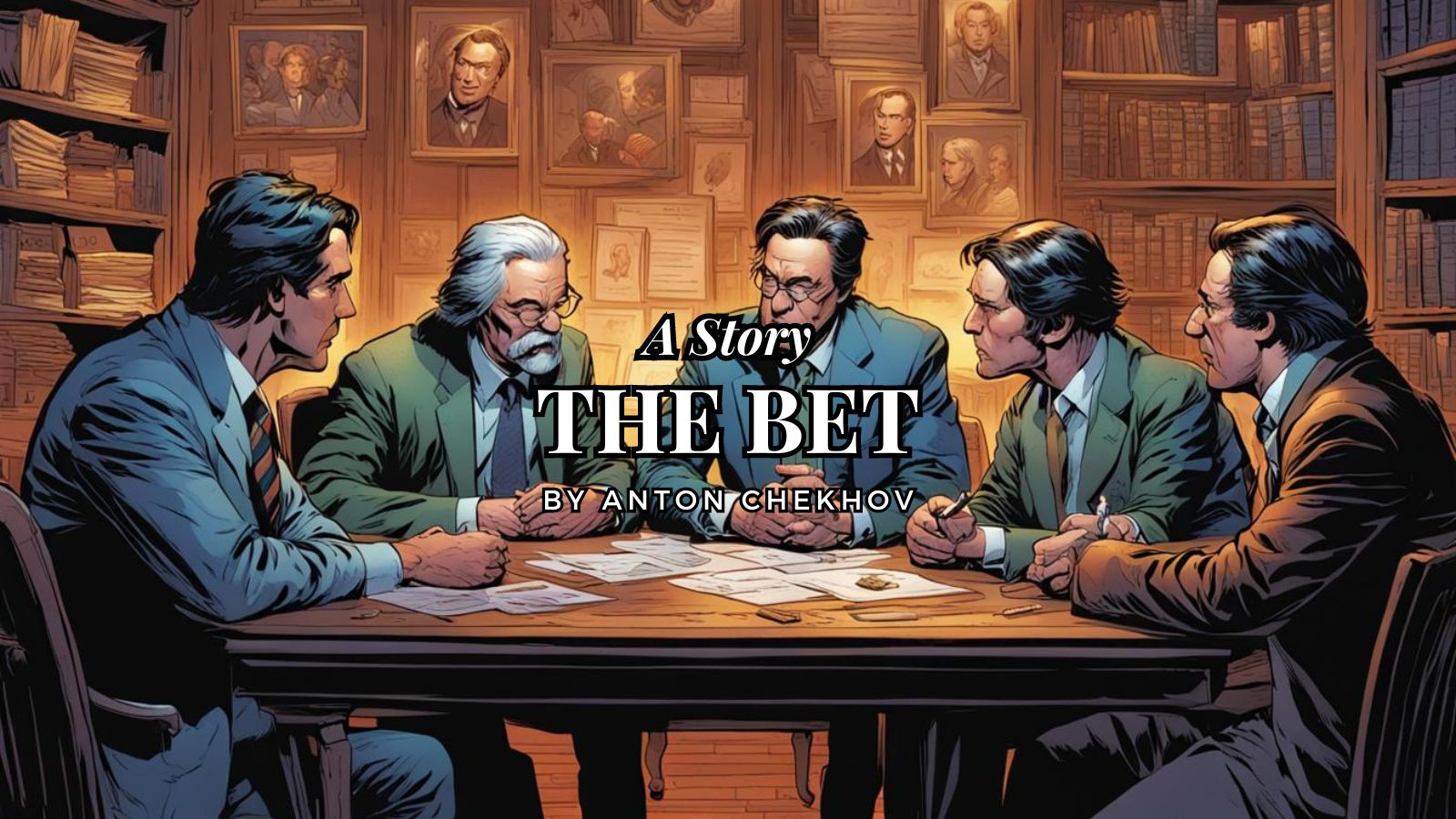The bet

"The Bet" by Anton Chekhov is a story about greed, punishment, and solitude. An old banker had made a bet to a lawyer 15 years ago when discussing capital punishment. The lawyer felt that life imprisonment was a more lenient sentence to capital punishment, the old banker thought differently. They then made a bet where the lawyer would spend 15 years in solitary confinement for 2 million rubles. Then, one dark autumn night, the banker came to realization that it has been 15 years since the lawyer was imprisoned, and began to panic. The banker had been financially struggling since 15 years ago and did not expect this situation when he made the bet, he was under the assumption that he would be far more successful by now. The banker than began to contemplate the murder of the lawyer to avoid paying what he owed, fretting about. Then, to his surprise, he found a letter addressed to him from the lawyer explaining that he did not want the 2 million rubles due to his wonderful experience in solitude after experiencing such enlightenment. Finally, the story ended without conflict as well as a lesson to the banker to not be consumed by greed and materialism.

psychoanalytical Lens
Presented by Abhirve, Henry, Nathan
This presentation covering a psychoanalytical perspective to "The Bet" brought to attention by Abhirve, Henry and Nathan was a particularly thought provoking display of the author's unconscious desires and anxieties. The presentation opens with a precursor of the story. The banker hosts a party in 1989 in Russia, he then makes a bet with a lawyer after a debate about capital punishment or life imprisonment being more lenient. He made a bet with the lawyer for 15 years for 2 million rubles. Analyzing this story through the psychoanalytical lens, it is essentially analyzing the unconscious thoughts and motives of characters, as well as a fragment of the author. We as a audience then witnessed Sigmund Freud's beloved invention of psychoanalysis.
SigmUnd Freud
Internal desire + super ego = ego
Internal desire is a individual's "id", it is the unfiltered intentions of a person without morals playing any role.
Next, the presenters discuss dream analysis. Dream analysis is a attempt to interpret dreams as the name suggests. Dream analysis reveals the inner anxieties of each character and helps one learn about what humans truly value. They converse about the factuality that humans are too captivated by greed, throwing away any morals. In this story, the banker is overcome with greed, obsessed with keeping the 2 million dollars at any cost, even murder.
Moving onto the subject of the author dynamic, the author Anton Chekhov was born in poverty, and his father left him to avoid paying debts. It is important to gauge a understanding of the author before the book was published. Knowing in the end that everyone is going to die, Anton reflects these conceptions in this story, known as "The Bet".
With the presentation drawing to a close, the audience is given an activity to analyze a psychological short film, "IMAGES". The film is about the main character Evan struggling with illusions and flashbacks about the deceased brother. Evan refuses time and time again to take his pills that help diminish these psychological viewings that he believes are real. The class is split into groups, we are then given analysis perspectives to analyze the film. Overall, I found this presentation particularly thought provoking, gaining more knowledge of the activity that occurs in a human brain that leads to decision making.
Sociological Lens
Presented by Dhiren, Akash, Finn
Dhiren, Akash and Finn approach the front of the classroom, ready to share the sociological criticism of "The Bet". They begin with the effect that literature has on society, including class dynamics and social structures. It is also important to consider how the author uses these metaphors to convey certain emotions. They then explain the story with great detail transitioning to discerning the social classes present in "The Bet". The lawyer is in a lower class where 2 million rubles is an earth shattering amount, whereas the banker is in a higher class where he is confident with taking risks due to his immense wealth. Cultural context is necessary to understand the method in which certain actions are taken and to ascertain the appropriate communication from the author. This story takes place in the late 19th century in Russia, a cultural and social upheaval took place during this time period, this is when death penalty and industrialization began to cause a divide in social classes. Due to bad working conditions and higher taxes, the lower class held strikes often, also receiving the unfortunate feeling of being separated from the higher class. This is how the banker behaves in this story. Social issues plague this story, the main conflict in this story is derived from the bet that the lawyer made with the banker about their opinions about if life in prison is more lenient than receiving the death penalty. Overall, this sociological analysis was implemented very well in the reader's minds with context of the short story, "The Bet". The presenters organized an activity to ensure that the audience gains a clear understanding of the lens being examined, they split the class into two portions, then hosted a debate. The dispute assigned is whether money or wisdom is more important in life. I found the debate very thought provoking, it raises the choice between a wealthy, easy lifestyle and the choice of knowledge. This debate unknowingly tests an individual's morals, I feel if this was a blind poll rather than having to publicly defend the matter, the results would be largely skewed. I felt that having a wealthy lifestyle is preferable to knowledge due to the benefits that follow with affluence.


Historical lens
Presented by Adam, Jisung, Charles
Adam, Jisung and Charles begin to present the historical analysis of the short story "The Bet", they begin with contextual information with where and when the story took place. They then examined authorship, discussing how this lens revolves around the author's biases or personal views impacting the narration and story telling. Politics plays a major role in today's society, it is the backbone of any public decision made or the outcome of any event which takes place in history. The political lens is useful to contemplate any change in that time period, such as the industrialization period. Finally, the presenters brought up the topic of recognizing the audience, this is vital to captivate the viewers and is certainly an important aspect to being an author. Bringing the presentation to a close, an activity is introduced. The presenters split the students into 3 groups and assign a research project of sorts. One group is assigned to research about George Orwell, the author and describe some recurring themes in George Orwell's novels. Overall, the presentation was well structured and clearly communicated, the group of 3 presented utilizing visual aids.